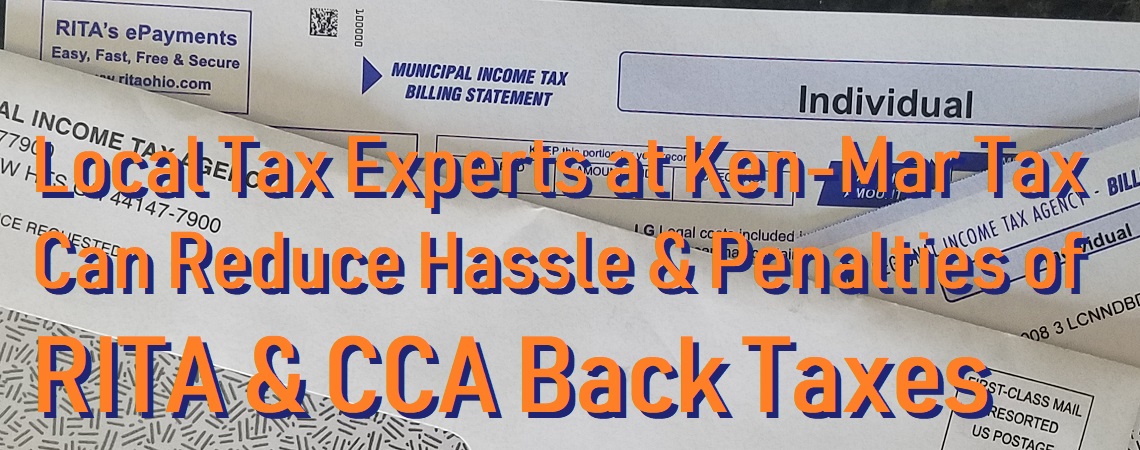
What to do About Back Taxes?
By now you know you can't run from your back taxes and you can't hide from your back taxes, but you do not have to work with a "tax resolution firm." From our experience, most tax resolution companies are large call centers, are not local companies, charge an initial fee of $3,000-6,000 and then drag out the engagement with a laborious process of scanning documents, waiting on hold... This article from Investopedia, "The Truth About IRS Tax Settlement Firms," can provide you an impartial assessment of why you may decide to steer clear of tax resolution companies. See our gripe about Google results for "Cleveland Tax Resolution Firm" on our Cleveland Tax Resolution page.
Working With an Enrolled Agent for Back Taxes
As an Enrolled Agent Ken Weinberg can represent you to the IRS (only CPAs, Attorneys and Enrolled Agents can do this) AND he has direct lines to the IRS. This means that for less than what you would pay for a tax attorney, Ken-Mar Tax can resolve your back taxes.
Unfiled IRS Income Tax Returns
If you’ve gotten behind on your taxes, you’re not alone. We know how it goes: once January rolls around, you gather your tax documents to file your tax returns by the deadline. Sometimes you need an extension. And maybe you don’t meet the extended deadline, and now your return is late and unfiled.
Then the next tax season rolls around, but you still haven’t filed last year’s tax return—so you don’t want to do the current one either, out of fear of the IRS or because you need last year’s data.
Now your problem is snowballing and unfortunately it feels more and more burdensome to get caught-up on your back taxes. You hear a radio commercial or see an ad on late-night TV that promises amazing tax resolution results if you call now. There’s a better option – Ken Mar Tax. As an enrolled agent of the IRS and a tax professional, Ken Weinberg can quickly help you sort through the issue and put a plan together for your back taxes.
Don’t Put-Off Getting Caught-Up with Back Taxes
If you have late, unfiled tax returns, you have an urgent problem that you should start to fix ASAP. The possible consequences include:
- The IRS preparing and filing a return for you—and almost always overstating the tax you owe by a lot!
- Criminal prosecution.
- Wage garnishment or other levy or property seizure.
The truth is that the IRS rarely criminally prosecutes people for not filing tax returns, but this can and does happen. The best way to avoid criminal prosecution is to voluntarily file any delinquent returns. The IRS has a time-honored policy that, in general, it will not criminally prosecute for failure-to-file those taxpayers who come forward and file their past-due tax returns.
How Far Back Do I Go When Filing Back Taxes?
If you have a long-standing problem, the IRS usually shows you some mercy. In general, the IRS requires you to file the most recent six years of tax returns to be in current compliance with your tax return filings.
Example. Betty Backtaxes hasn’t filed individual income tax returns since 2012. Under the six-year rule and because the deadline for the 2020 tax return has passed, Betty can file her 2015 though 2020 tax returns and the IRS will consider her in compliance with her tax return filings. And the IRS generally won’t request her individual tax returns for tax years 2012 through 2014. The IRS could require you or Betty Backtaxes to file tax returns beyond the six-year period. But this is not common and requires approval from an IRS manager.
(side note: the six-year policy is merely an IRS policy and not actual law.)
Once you file a tax return, the general three-year statute of limitations on assessment of tax starts to run. If you never file a tax return, you give the IRS open season with no time limits to assess tax for that unfiled tax year.
Example. Henry Nonfiler did not file a 1961 tax return. The law allows the IRS to collect the taxes for 1961.
In certain circumstances, you may find it advantageous to file a return beyond the IRS’s six-year requirement even if you aren’t required to.
Example. Paula Procrastinator didn’t file a tax return for tax year 2014. The IRS eventually decided to do a 2014 return for Paula that showed $20,000 in taxes due, plus thousands of dollars in interest and penalties. But if Paula had filed an original 2014 return, that return would have shown $4,000 in actual taxes due. By filing an original return, Paula would have saved $16,000 on her tax bill and reduced her penalties and interest by about 80 percent!
Payroll Tax Returns? Read This!
If your business has unfiled payroll tax returns but made all of its required tax deposits, and the returns show no tax owed, go ahead and file those delinquent returns. But if you made only some or none of the required tax deposits, and your payroll tax returns show that you owe the IRS money, you need to take special care before you file them. If you run your business as a limited liability company or corporation, you are not personally liable for the payroll tax balances; only your entity is.
But the IRS can potentially transfer liability for the “trust fund” portion of payroll taxes to you as the person responsible for allowing the business entity to fail to pay the IRS.
What are “trust fund” taxes? They are the taxes that you collect on behalf of your employees and send to the IRS—namely, the employees’ federal income tax withholdings and their half of FICA taxes. If you have unpaid trust fund taxes, it is in your best interest to pay off the trust fund portions first. To do this, you send a designated payment to cover the trust fund taxes. The IRS honors such designations. If you don’t designate the payment, the IRS applies the payment to the non-trust fund taxes first!
Foreign-Sourced Income or Foreign Assets? Read This!
The IRS has been hammering international tax compliance for several years. Now, using the tools available in the Foreign Account Tax Compliance Act, the IRS is getting information from foreign financial institutions on United States taxpayers. If you have foreign assets, such as bank accounts or securities accounts, or foreign-sourced income, and you haven’t filed your United States tax returns or your FBARs (Foreign Bank Account Reports), if required to do so, do not file your tax returns by simply mailing them. You likely need to use a special IRS compliance program to file your tax returns. In this circumstance, you need professional assistance from a tax attorney or tax professional who specializes in international taxcompliance issues. A misstep could lead to severe penalties or even criminal prosecution.
After I File My Back Taxes—What Then?
Once you file those late returns, you’ll feel a big sense of relief that you’ve started on the path to getting this behind you. It’ll take several months for the IRS to process those returns. Here are a few things to keep in mind (if you worked with Ken-Mar Tax to resolve your back taxes, we keep helping through this process):
- The IRS will send you a notice for each tax return it processes. Check the notice to make sure it matches the return as you filed it. If it doesn’t, and if you don’t agree with the change, call the telephone number on the notice to speak to an IRS representative about it. If you’re working with Ken Weinberg, just let him know and he’ll call the IRS on your behalf.
- If any of your late returns show a balance owed, the IRS will likely hit you with penalties and interest for one or more years. If you’re working with Ken-Mar Tax we pull all the strings to get all potential penalties waived. If you’re going this alone, read our article “How to Get IRS Penalties Waived?” to see whether you can get some of those IRS penalties removed. Look at the earliest year you just filed to see whether you can get “first-time abatement” for that one year.
- If, after the dust clears, you are going to owe money to the IRS for your individual tax returns, see Owe Back Taxes? Scary Letters from the IRS? Your Options. for ideas on how you can manage that painlessly. (Well, relatively painlessly, because nothing with the IRS is ever trouble-free!)
- If you are filing returns that are more than three years past their due dates, and the returns show refunds due you, you are likely filing after the statute of limitations for refunds. If the statute of limitations has passed, the IRS removes any amount payable to you and puts your refund money in the U.S. Treasury, and you simply say good-bye to that money.
Contact Us
- If you have back taxes and want to know the timeline and/or costs to get your back taxes resolved
- If you own a small business and want to discuss tax reduction strategies for the self-employed
- If you’re worried your last tax expert wasn’t doing the best they could have and want a second opinion…
Contact Ken Weinberg to set up a free consultation by filling out the form on this page.




